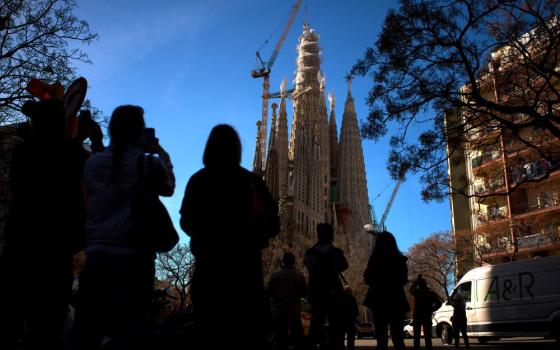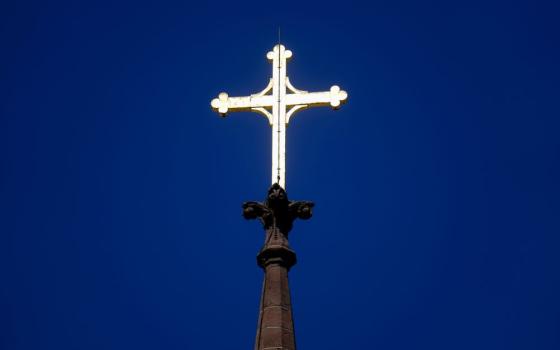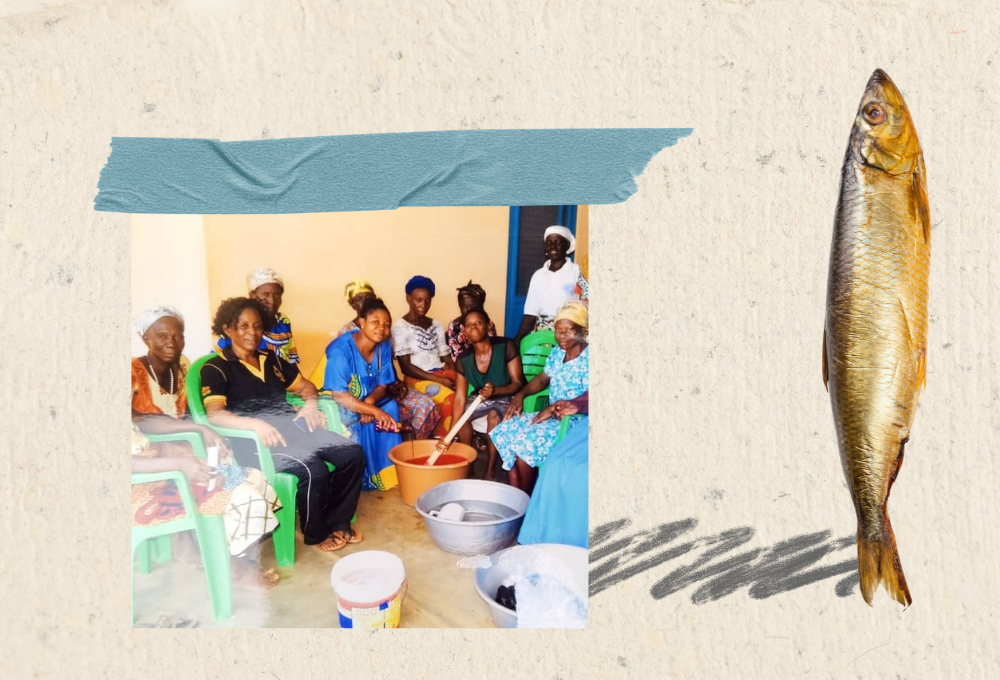
Inset: Members of the St. Monica Widows Association learn how to brew pito, a local Ghanaian drink. (GSR graphic/Olivia Bardo; photo of women courtesy of St. Monica Widows Association)
Editor's note: This story is part of Out of the Shadows: Confronting Violence Against Women, a series by Global Sisters Report and Global Sisters Report en español, focusing on how Catholic sisters respond to or are affected by this global phenomenon.
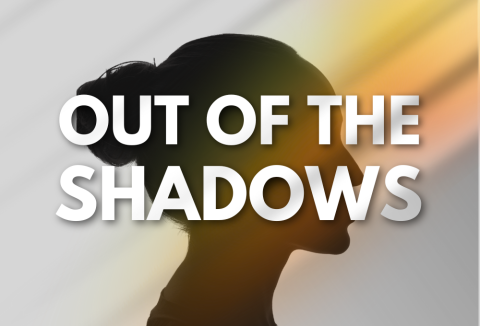
(GSR logo/Olivia Bardo)
Sr. Gabriel Nonaah of the Sisters of Mary Immaculate in Ghana was moved by the cruel treatment faced by many widows in the name of traditional rites by some tribes in the country. In 1985, she established St. Monica Widows Association in the Daffiama-Bussie-Issa District in the Upper West Region of Ghana to provide these vulnerable women with empowerment, education and self-reliance.
Nonaah, now 86, spoke to Global Sisters Report in April during one of the association's weekly Friday meetings. She recounted a widow who was thrown out by her husband's family after she refused to marry one of his relatives.
"I intervened by talking to the family members, bringing to light the laws of the Catholic Church. I was able to bring this woman back to the house, though the family declared no responsibility towards her well-being," Nonaah said.
Widow's rites in Ghana vary. Some women must prove their innocence through a series of dehumanizing rites and practices, including forcibly searching the home after a husband's death. In cleansing rituals, the widow is pressured to lie by her husband's remains. She may be asked to drink the water used in bathing his body and even bathe in the same water, all to prove that she was not involved in the death.
The widow's properties are often taken, which poses a danger to her emotional health and overall well-being.
Widows can be subjected to periods of mourning lasting from a few months to a year, which may compromise their ability to work and care for their children. Some of these practices are enforced by older women, who see themselves as custodians of these rites.
Ghana has taken steps to criminalize widow's rites, but the practices continue.
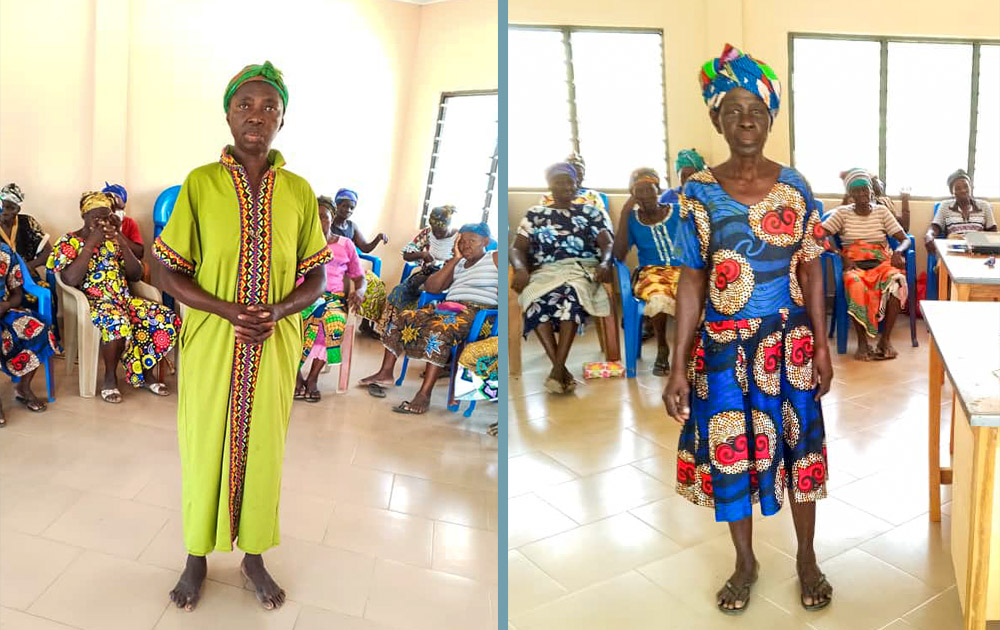
From left: Edith Vo-enga and Angelina Dakuurah, both widows, attend a weekly meeting of St. Monica Widows Association in Ghana. (Photos by Juliana Atuuna)
Edith Vo-enga, a 57-year-old member of St. Monica Widows Association, said, "We would have died or gone to the street had it not been for this association. It has been seven years since my husband died. Before his death, our children were in school but were withdrawn because no family member was ready to support them."
Vo-enga said her family now depends on inconsistent income from brewing pito (a local Ghanaian drink), which is insufficient for a meaningful livelihood.
Angelina Dakuurah, 72, who told GSR she doesn't remember the period of her husband's death, said her husband left her with five children. His family has since seized portions of the land he was farming.
"I used to [have a] small pito business, but as I advanced in age, I became disabled. My concern now is for this portion of land to be returned so my children can farm and earn a living," Dakuurah said.
Nonaah told Global Sisters Report that her encounter with different women's groups in the Wa Diocese changed her. "I had a vision to form a women's order. Instantly, I thought God wanted me to form a religious congregation, so I said, 'Lord, you know I cannot do this,' and brushed it off. Then, [the vision] came a second time that I should do something for the widows."
She shared her vision with Bishop Gregory Ebolawola Kpiebaya, then head of the Wa Diocese, who endorsed and supported her. In 1985, she reached out to all the widows in the Nandom town area in the Wa Diocese.
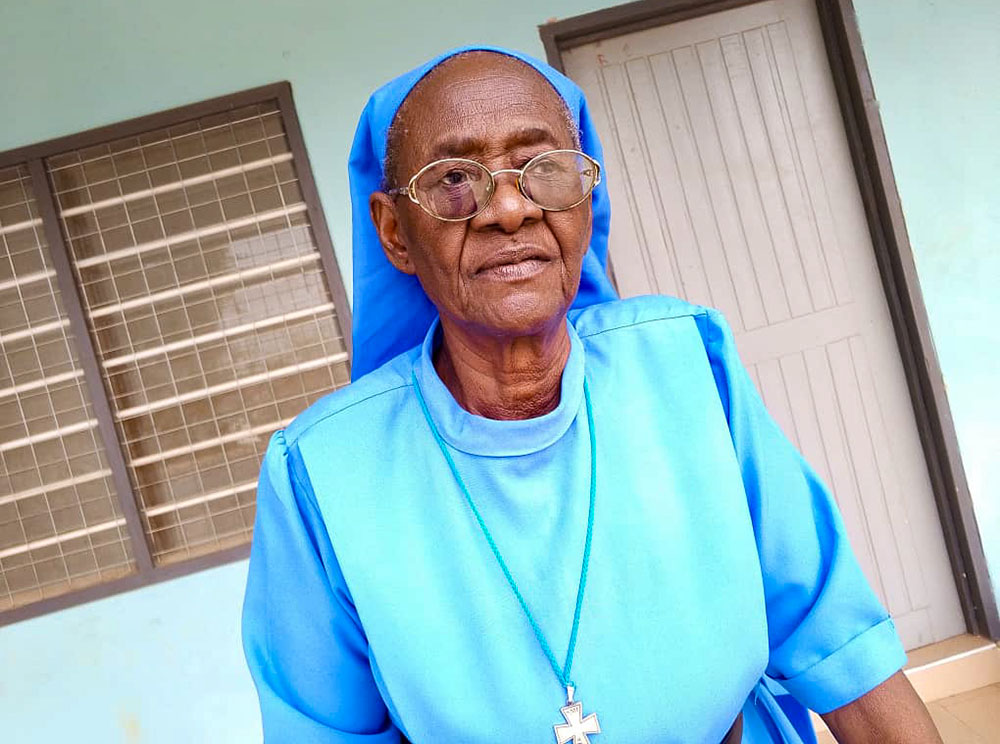
Sr. Gabriel Nonaah of the Sisters of Mary Immaculate Congregation established the St. Monica Widows Association in the Daffiama-Bussie-Issa District in Upper West Region, Ghana. (Juliana Atuuna)
"They [expected] material gifts from me, but later understood that I was not giving them fish but intended to teach them how to fish."
She said that before the foundation of the association, widows in the area used to go through a widowhood rite known as yagra, performed after their husband's burial, when the women are "smeared with clay to distinguish them from other women."
Other areas in the country have different rites. Some widows are forced to remarry within the family to a man who already has a wife, and they are often treated poorly.
According to the World Bank, one in 10 African women above the age of 14 is a widow, and 6% are divorced.
"The number of widows who came out in the early days was overwhelming," Nonaah said. Eventually, she divided association members into decentralized groups within the Wa Diocese, with some groups in other dioceses in Ghana as well, she said.
There are currently 910 widows under Nonaah's care within the Wa Diocese, and 45 groups. Many groups also welcome Muslim widows.
As part of her work, Nonaah teaches widows catechism and about Catholic values. She also empowers them through self-reliance activities such as brewing pito, soap-making and petty trading.
Mary Mother of the Church Sr. Victorine Torkenoo, who once worked with widows groups, told GSR, "It is worrisome that the death of a man has become a period not just of mourning, but also a season for widows to prove that they loved their spouses, were faithful to them and had no hand in their deaths."
She lamented that as part of these customs, some widows are forced to kneel on palm kernel shells, and some go about their daily chores half-naked for a whole year and walk barefoot.
Advertisement
"Women are in such perpetual bondage of fear because of our culture that they forget there is freedom in Christ. Our sisters and mothers need education to understand that certain cultural practices are simply crude and cruel and that the church has [the] power to eliminate widowhood rites," Torkenoo said.
Torkenoo often visits with widows in their homes. She prays with them and encourages them in their trying moments.
"The widows see me as a ray of hope. I focus on the spiritual aspect and counseling, as fear is injected into them by the families of their deceased husbands. Sometimes, it makes them believe that the ghost of their husband could harm or kill them."
Sharing her experience with GSR, 68-year-old widow Augusta Aku said that two days after the death of her husband last fall, his family traveled from their village in Accra to search her home without her consent. "It was like an ambush in the name of traditional customs," she said.
Married for more than 35 years and with a son, she said, "I was asked to sleep by my late husband when the mortal remains were being prepared in the house."
After the burial, her husband's family demanded to discuss the properties.
"I'm tired of these humiliations," she lamented. "The discriminatory practices from my husband's family have inflicted pain on a grieving widow like me, and it makes no sense in modern society."
Aku said that these practices infringe on a widow's rights and freedoms and do nothing but add to the pain of loss.
Incarnate Word Sr. Esther Kutie, an advocate for widows, said, "I strongly believe that with the level of formal education as a nation, some of our cultural practices should be eliminated. What the widows need is liberation from the bondage of torture and humiliation."




